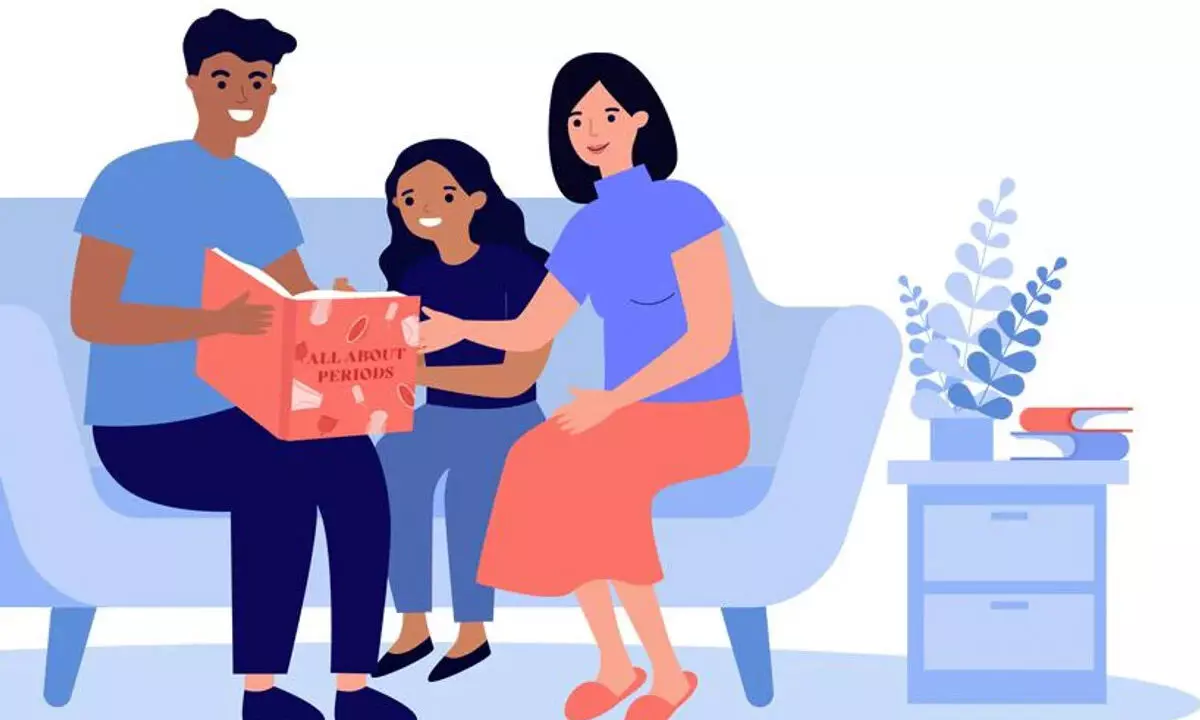Engaging tips to talk about periods

Begin conversations about bodies and puberty early, around age 8-10.
- Start at an early age and keep it ongoing:
Begin conversations about bodies and puberty early, around age 8-10. Don't treat it as a one-time "talk" but as an ongoing dialogue. This helps normalize the topic and makes children more comfortable asking questions as they arise.
- Use proper terminology:
Use correct anatomical terms like "uterus" and "menstruation" rather than euphemisms. This promotes body literacy and reduces shame or embarrassment associated with these words.
- Make it a family conversation:
Include all family members, regardless of gender. This helps boys understand and be supportive, while showing girls that periods are a normal topic of discussion.
- Use visual aids:
Diagrams, books, or even educational videos can help explain the menstrual cycle in a clear, factual way. This can make the information more engaging and easier to understand.
- Share personal experiences:
If you menstruate, share your own experiences. This can include how you felt when you got your first period, how you manage symptoms, or funny stories. This personal touch can make the conversation more relatable.
- Normalize period products:
Keep pads, tampons, or menstrual cups visible in the bathroom. Explain how different products work and let your child handle them. This familiarity can reduce anxiety about using them when the time comes.
- Address emotional aspects:
Discuss the emotional and physical changes that come with menstruation. Talk about mood swings, cramps, and how to manage these symptoms.
- Use everyday moments:
Take advantage of relevant moments in daily life to discuss periods. This could be while shopping for underwear, seeing a tampon commercial, or when a TV character experiences their first period.
- Role-play scenarios:
Practice what to do if a period starts unexpectedly at school or during sports. This can help build confidence in handling real-life situations.
- Discuss cultural perspectives:
Talk about how different cultures view menstruation. This can be an opportunity to address and challenge any negative stereotypes or taboos.
- Make it fun and positive:
Use games, quizzes, to make the topic more engaging. Emphasize that menstruation is a sign of a healthy, functioning body.
- Address hygiene and self-care:
Discuss the importance of good hygiene during menstruation and self-care practices like exercise, healthy eating, and rest.
- Be prepared to answer tough questions:
Children might ask questions that seem embarrassing or difficult. Stay calm and answer honestly. If you don't know something, research it together.
- Use technology:
There are many apps designed to track periods and provide information. Exploring these together can be a fun and educational activity.
- Discuss practical matters:
Cover topics like how to dispose of period products, what to do about stains, and how to manage periods during activities like swimming or sleepovers.
- Keep the door open:
Always end conversations by reminding your child that they can come to you with any questions or concerns, no matter how small they might seem.
- Celebrate:
Consider having a small celebration when your child gets their first period. This reinforces the idea that it's a natural, positive part of growing up.
Remember, the goal is to create an atmosphere where periods are seen as a normal, healthy part of life. By approaching the topic with openness, positivity, and factual information, you can help your child feel prepared and confident about this important aspect of their development. Every child is different, so be prepared to adapt your approach based on their individual needs and comfort level.
(The author is Gynaecologist & Consultant at Ujaas (A menstrual health and hygiene management social enterprise)










